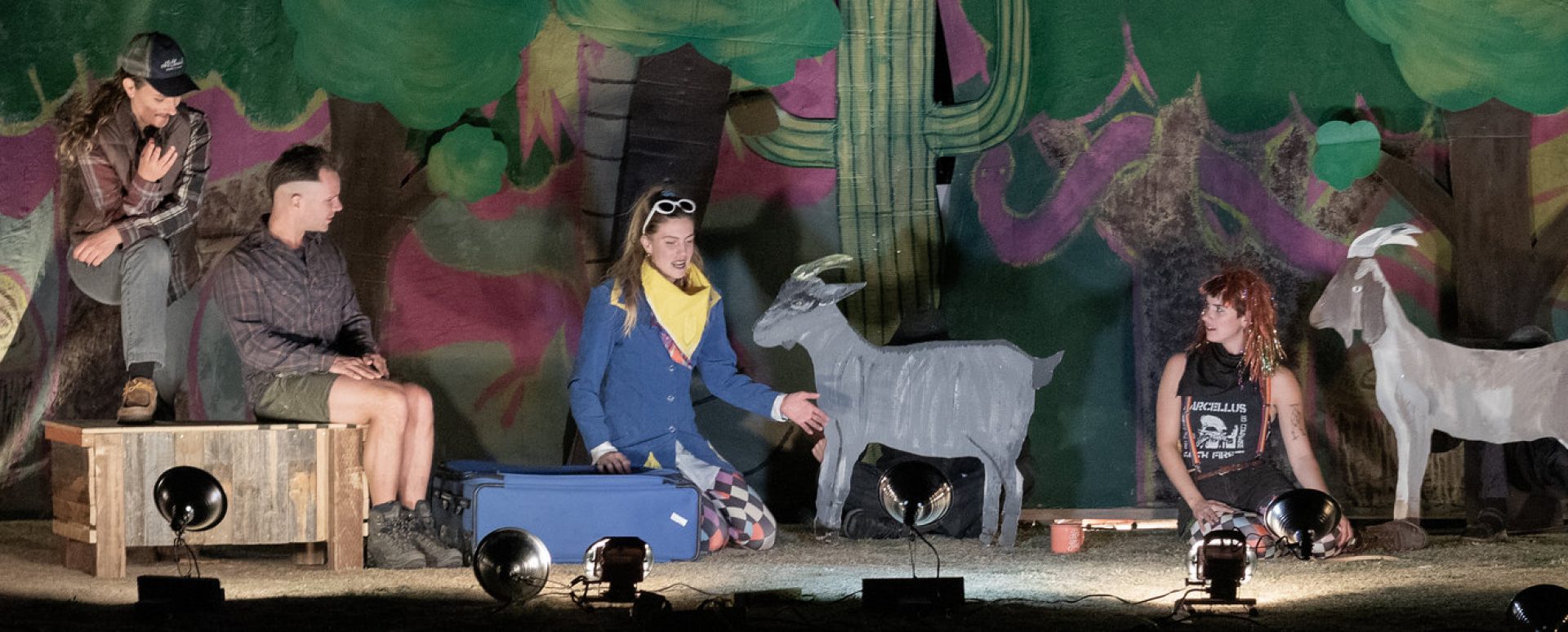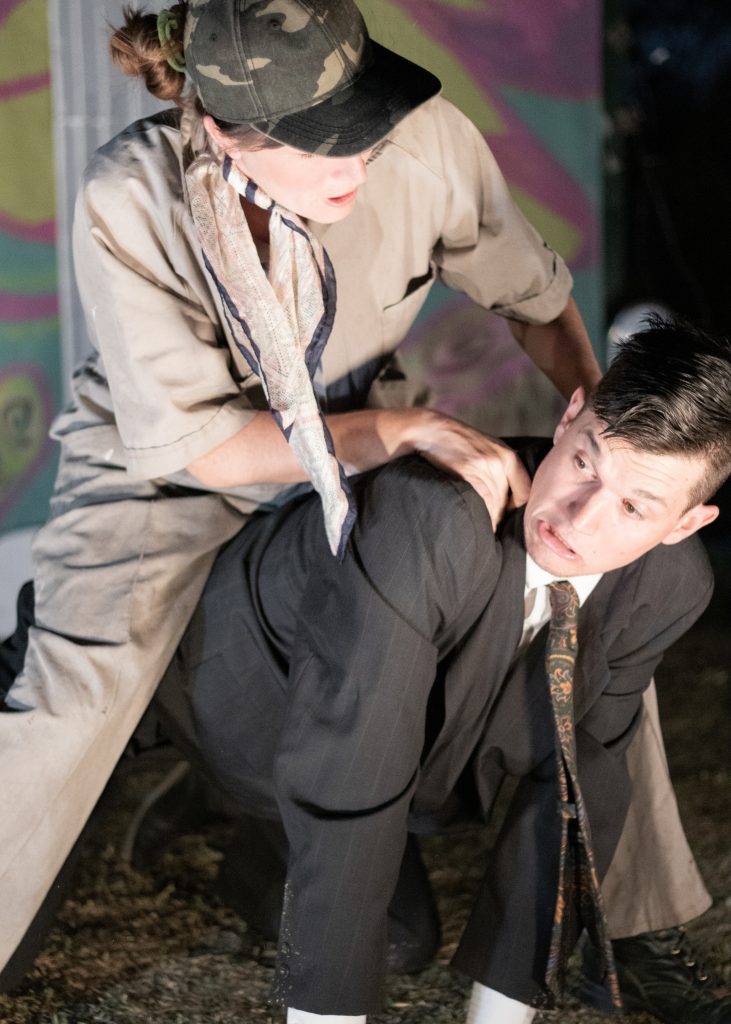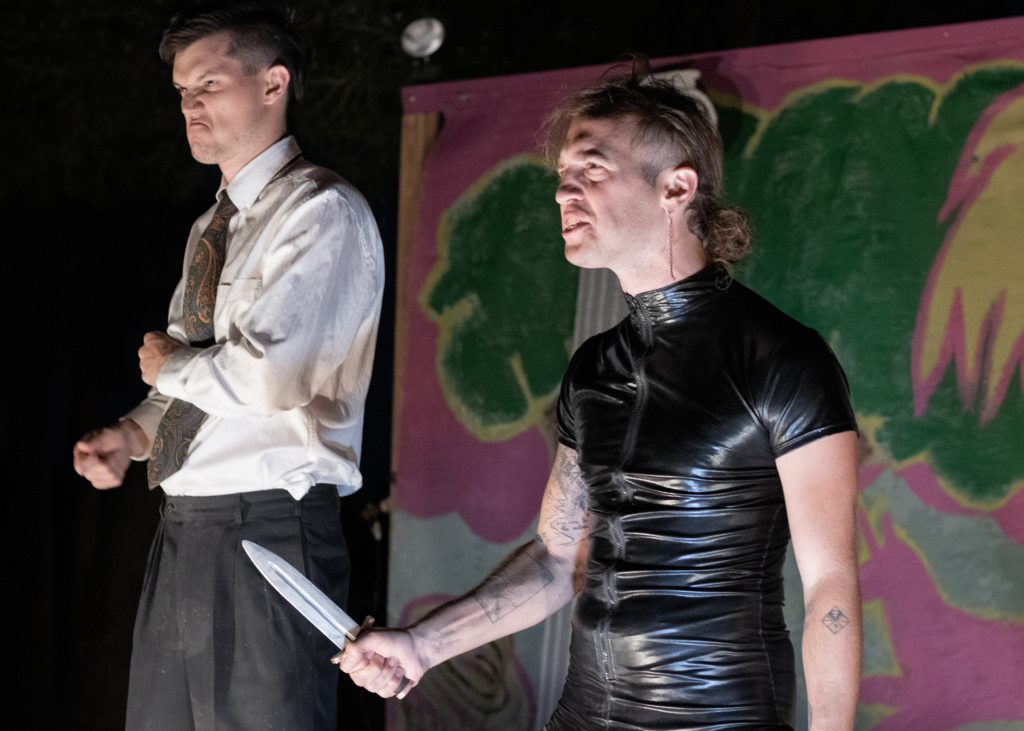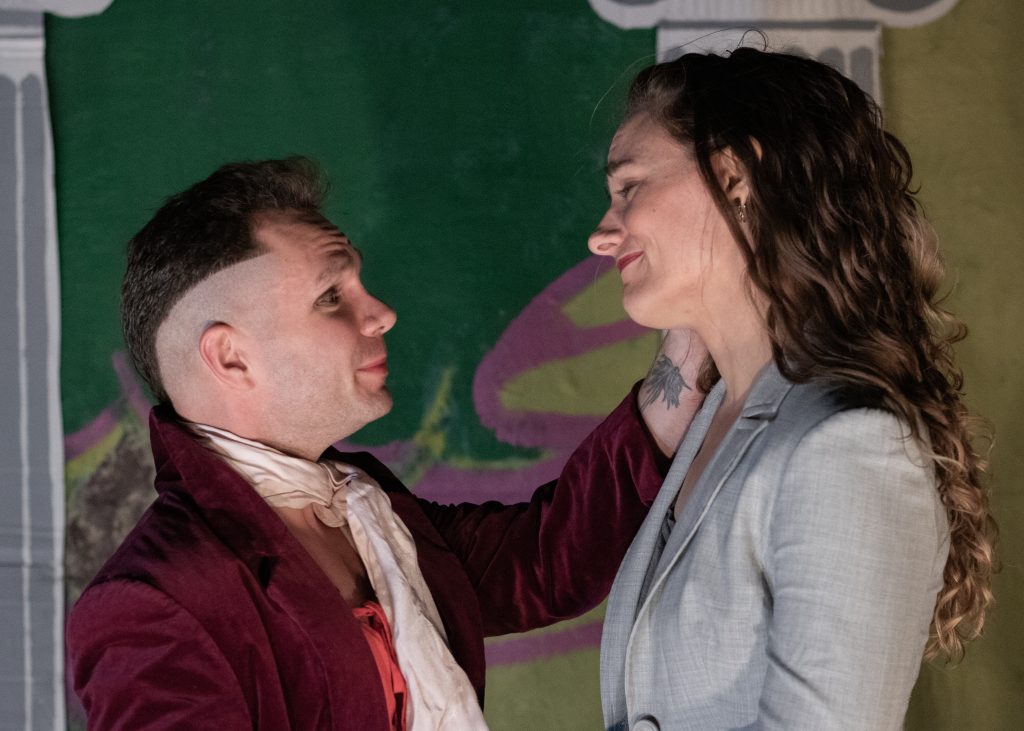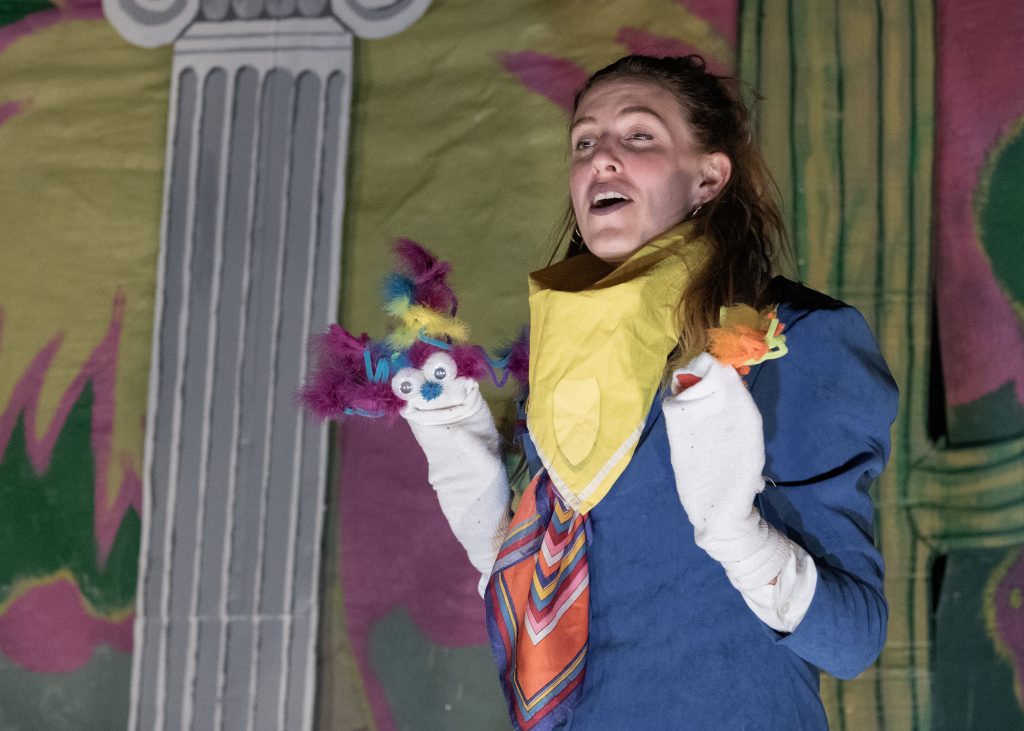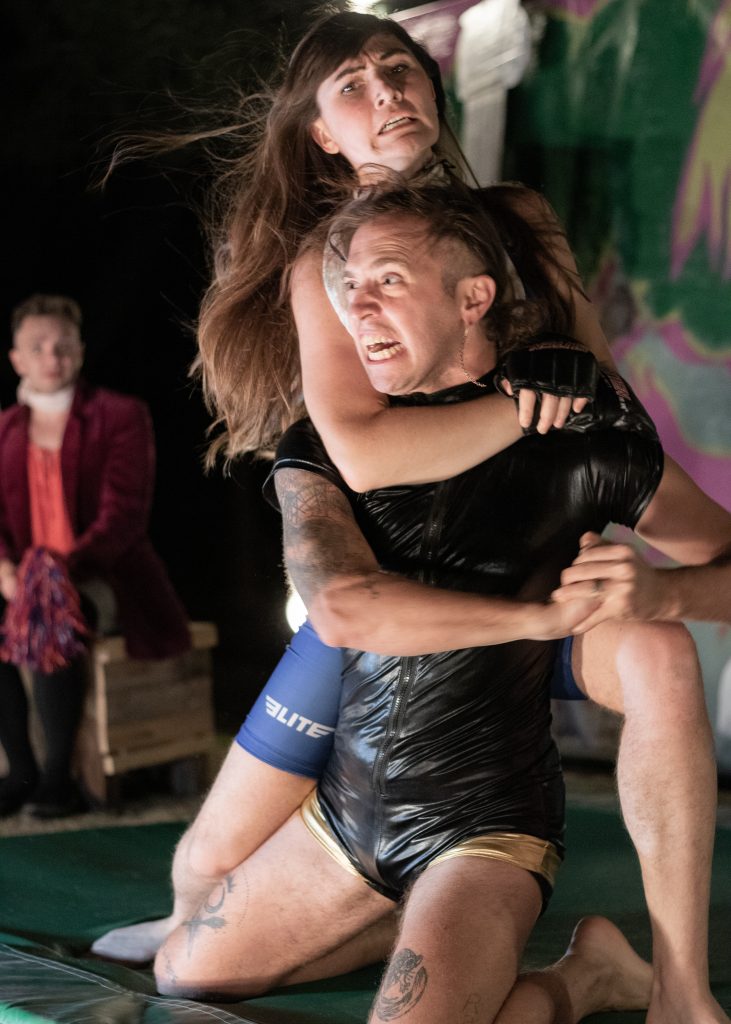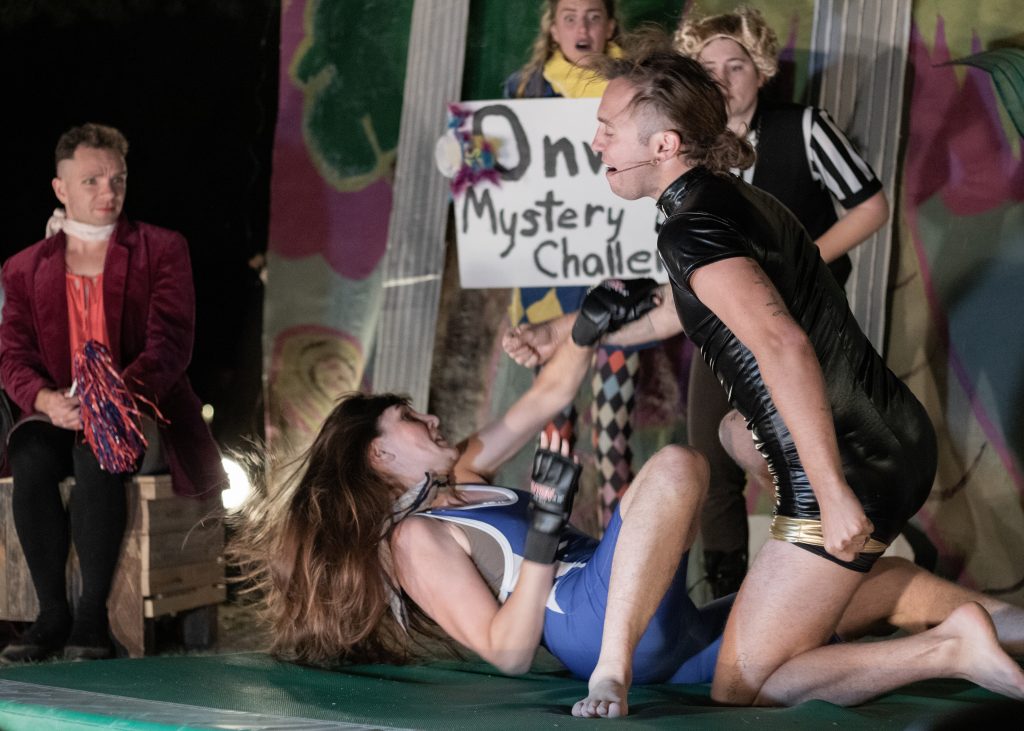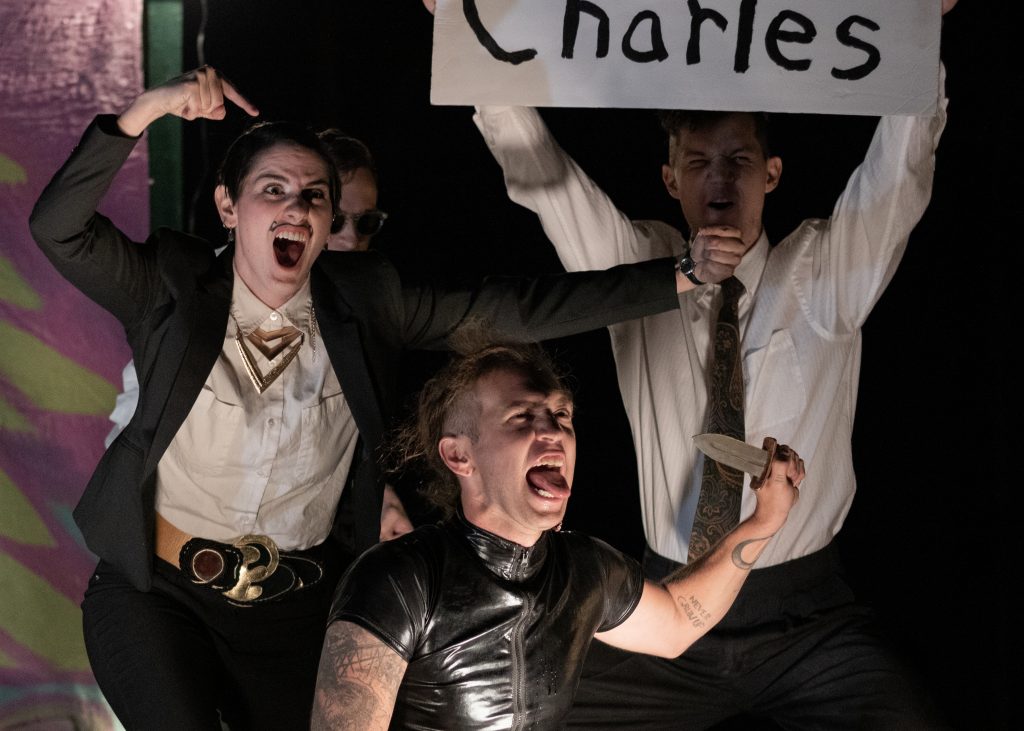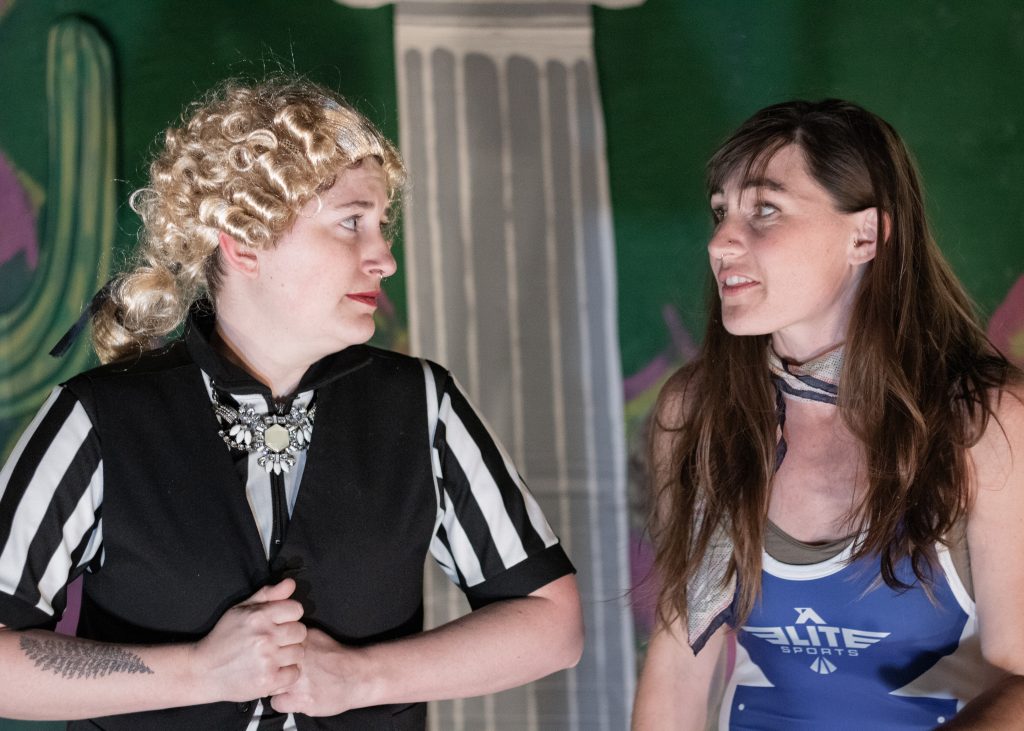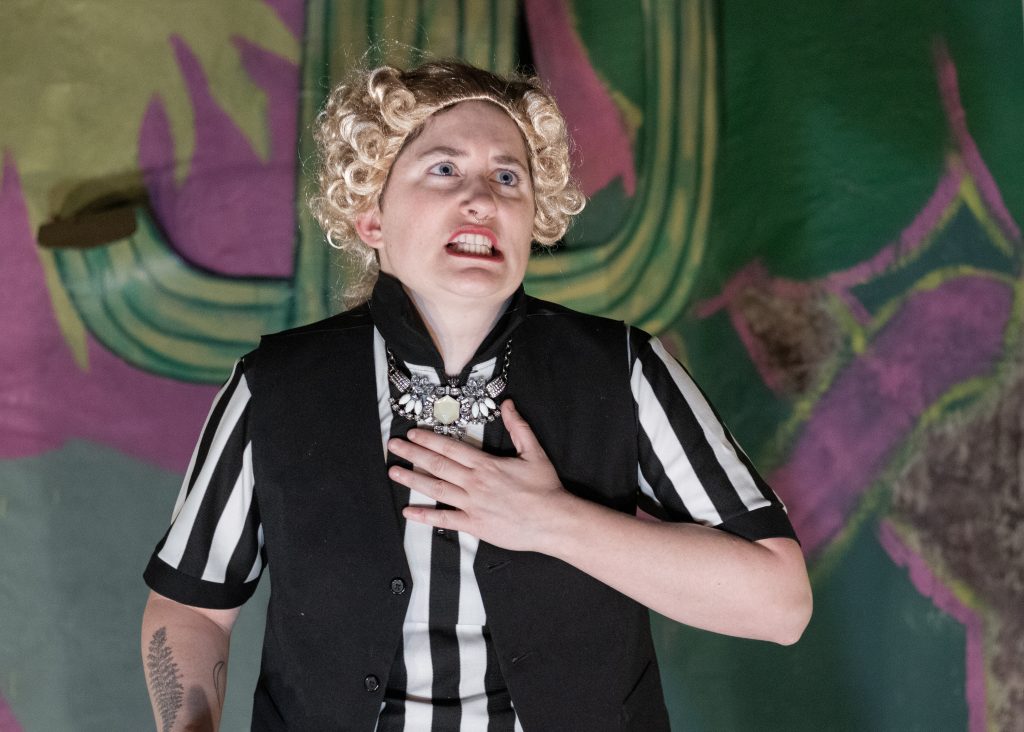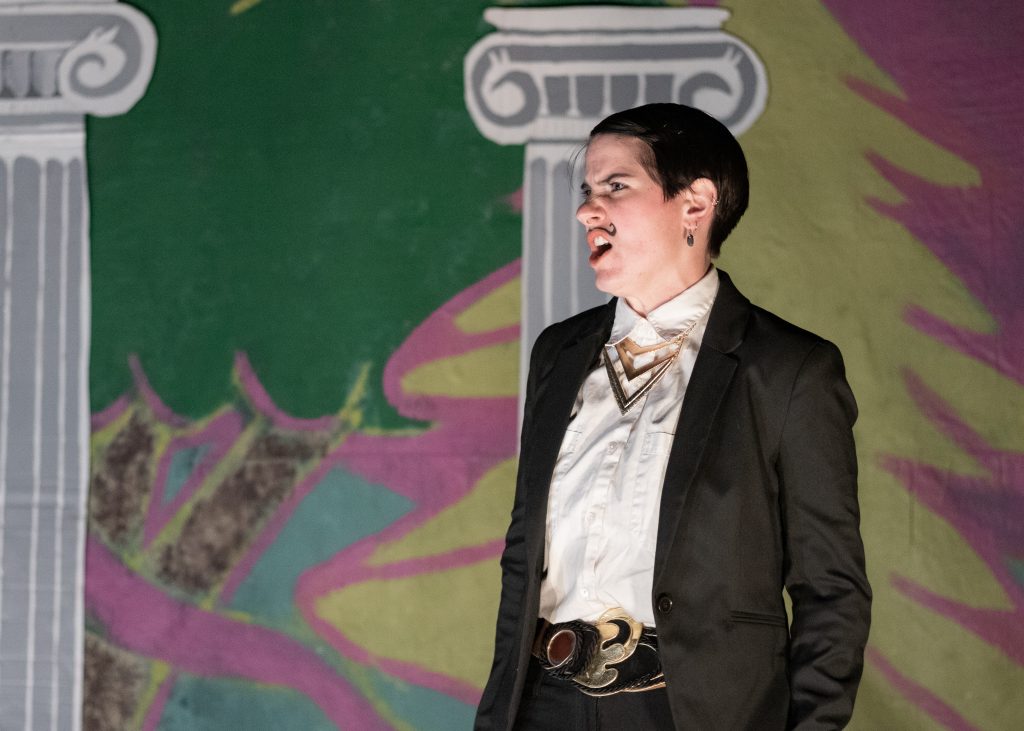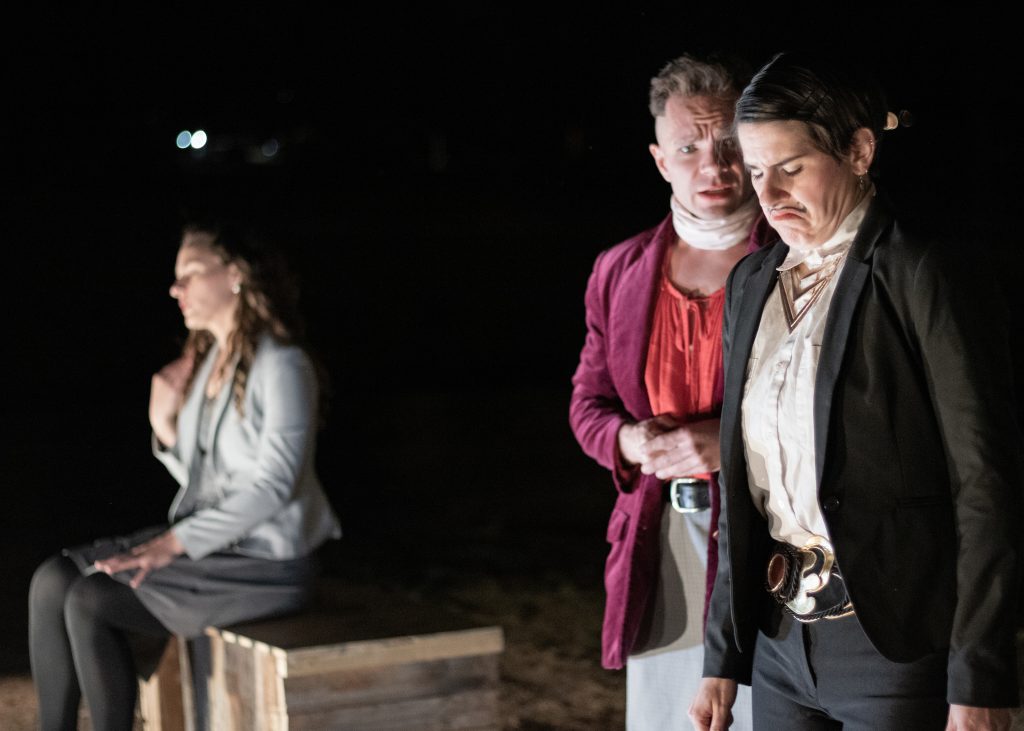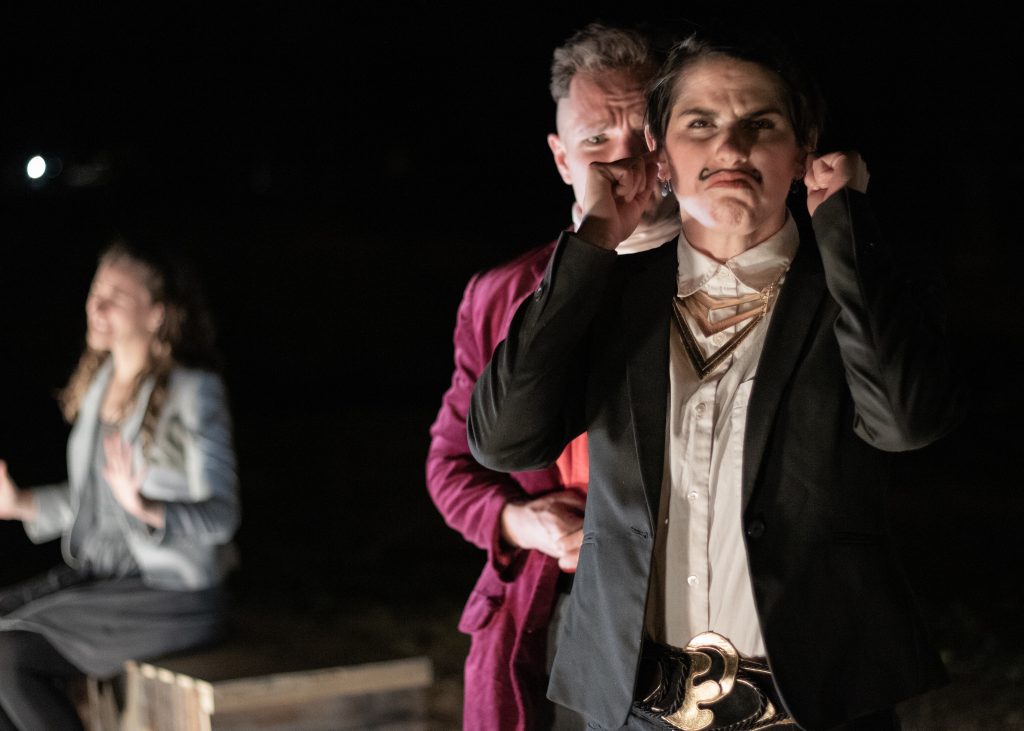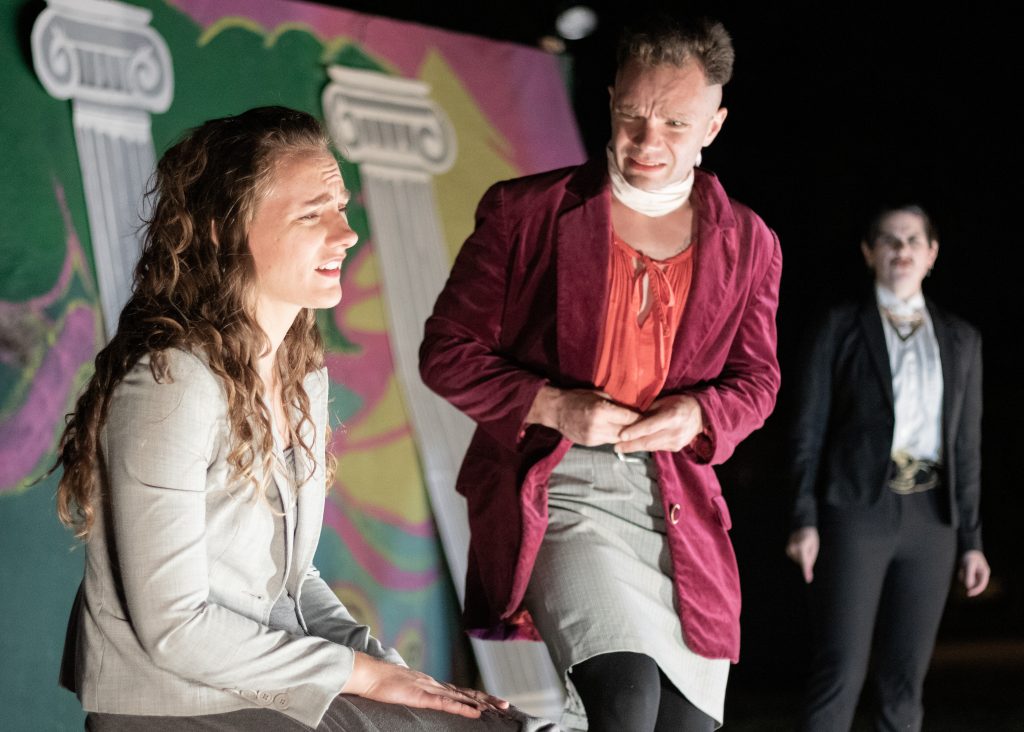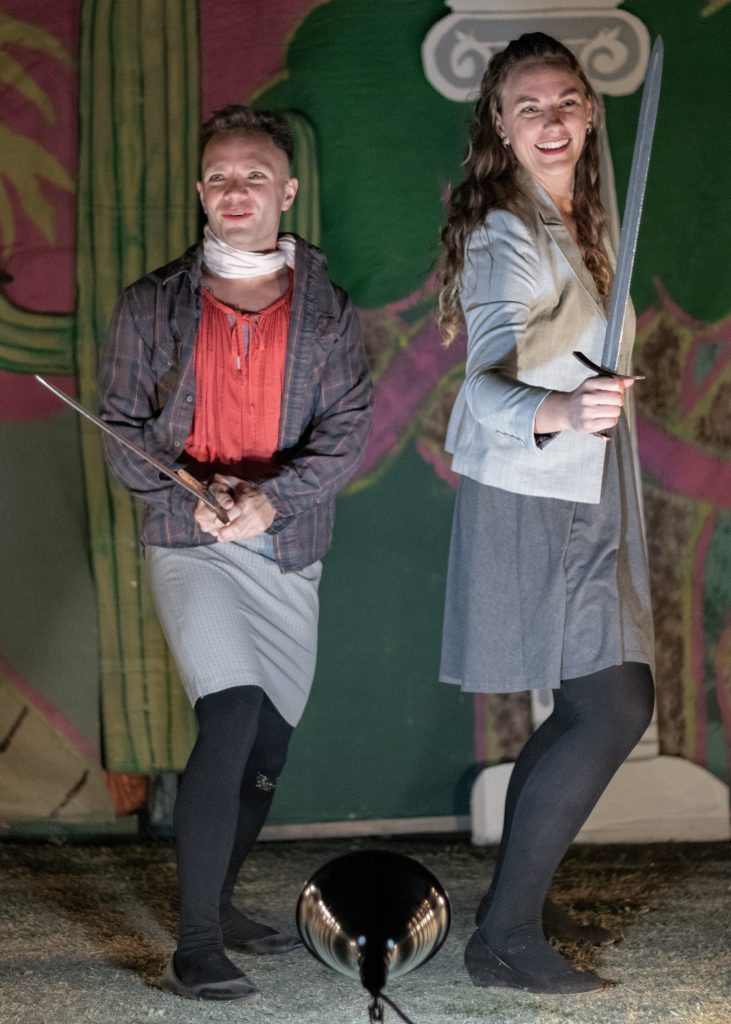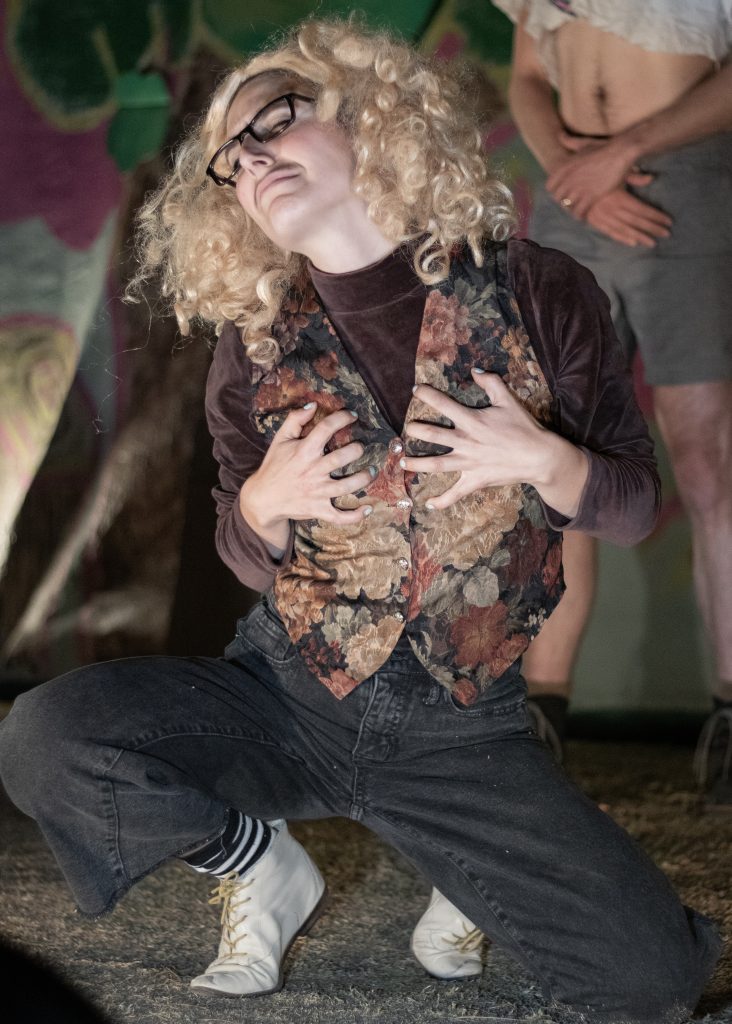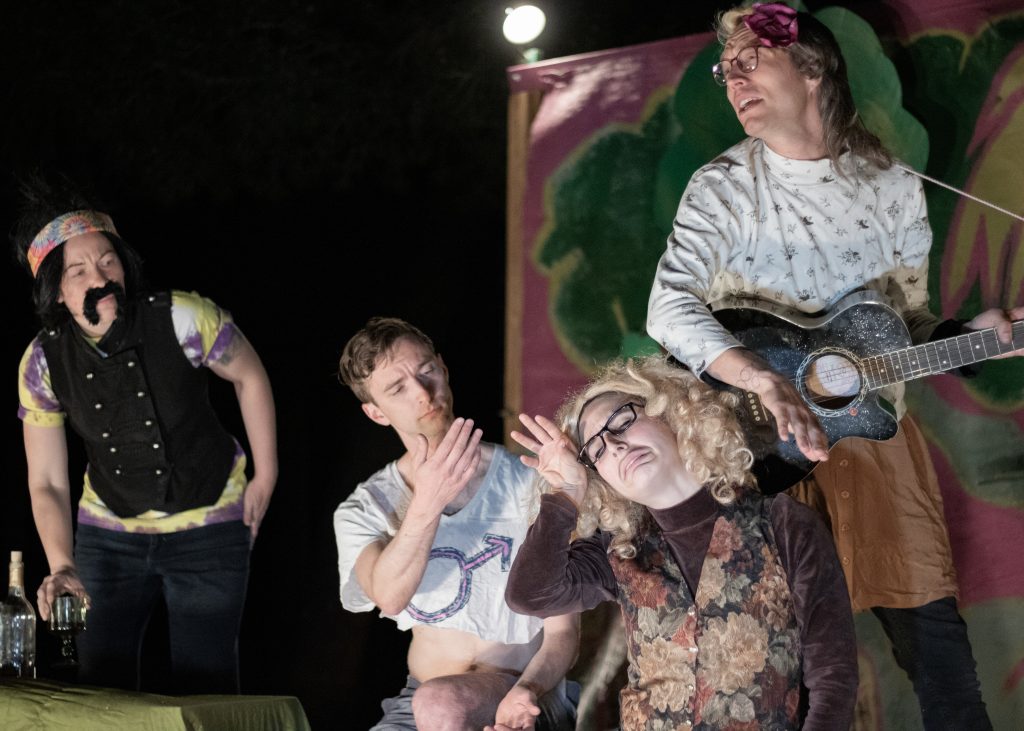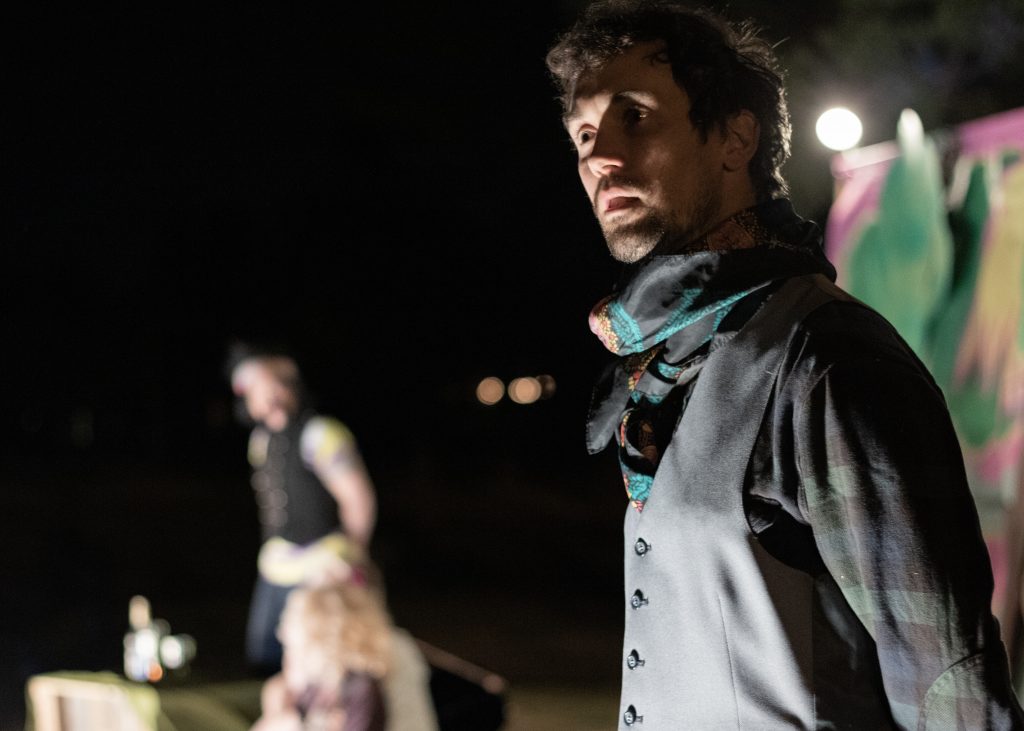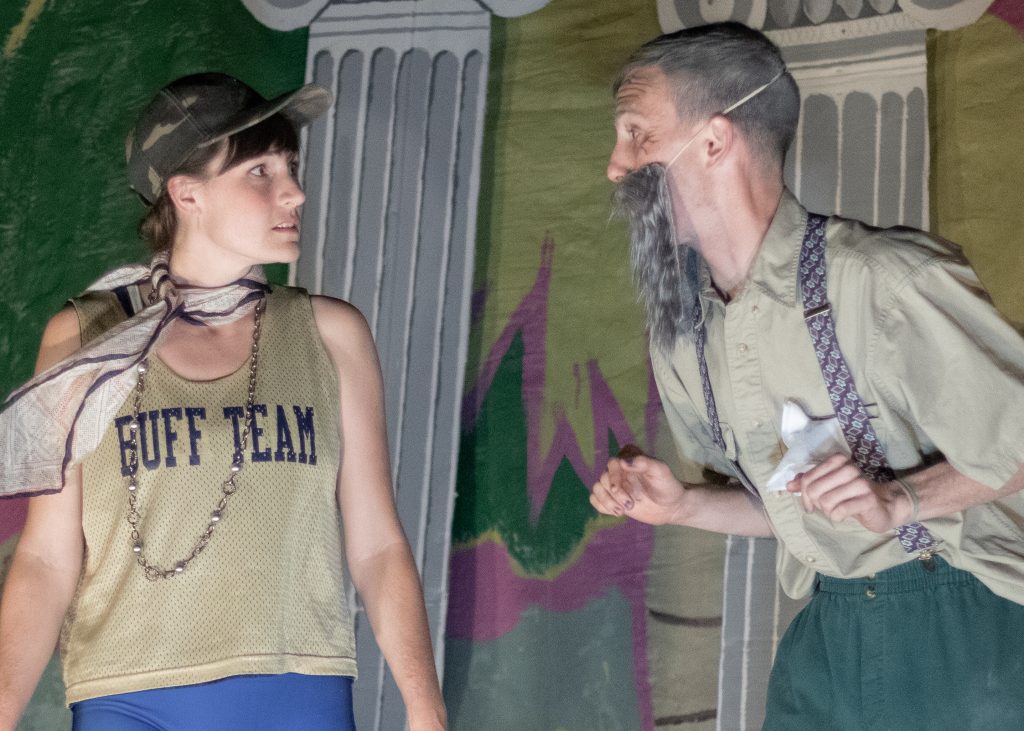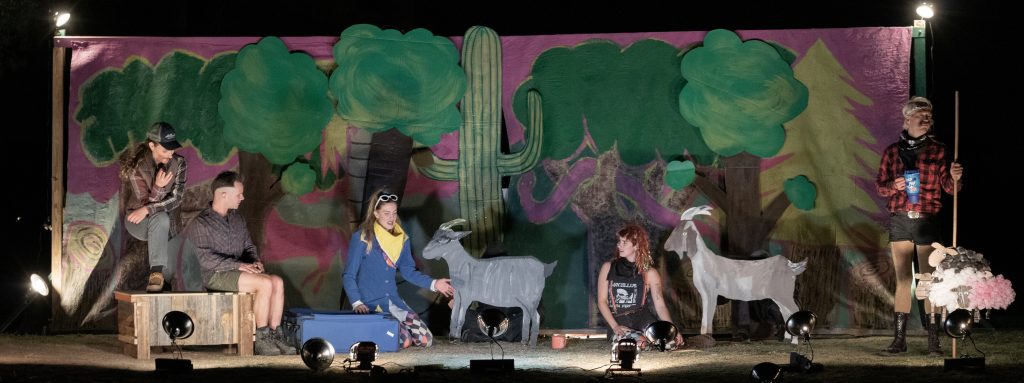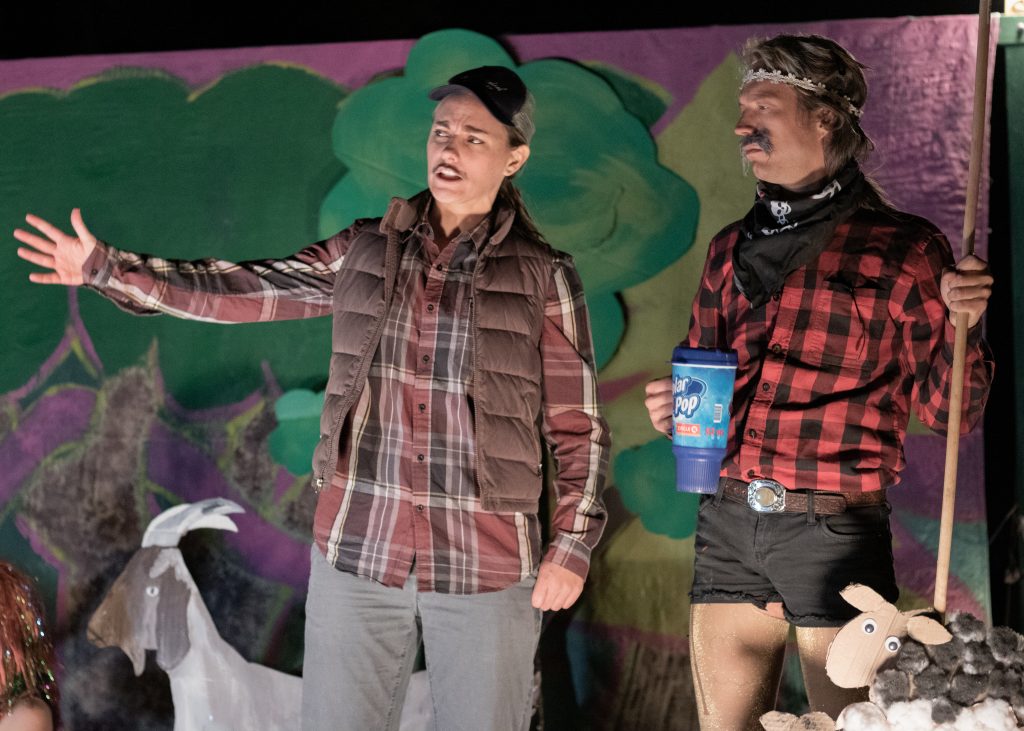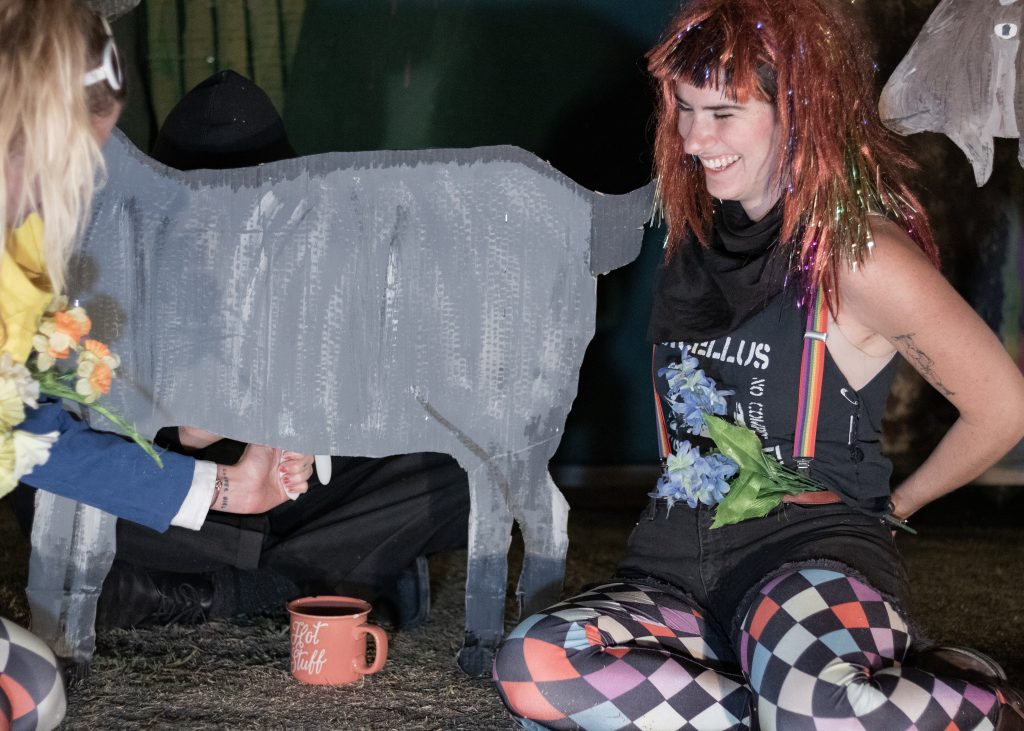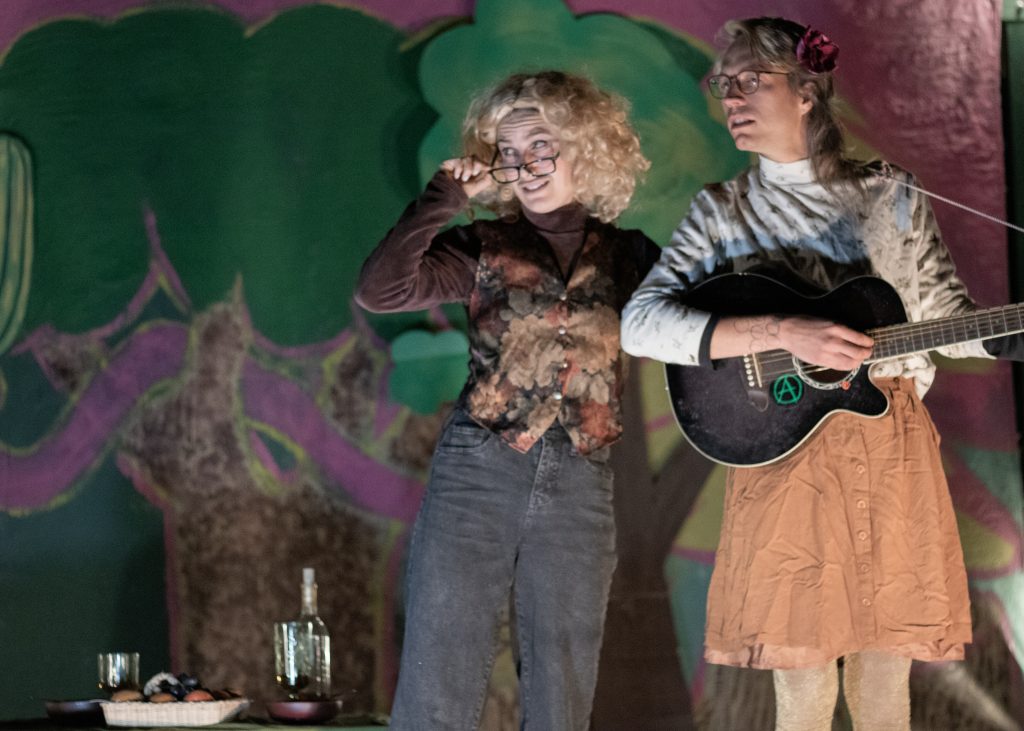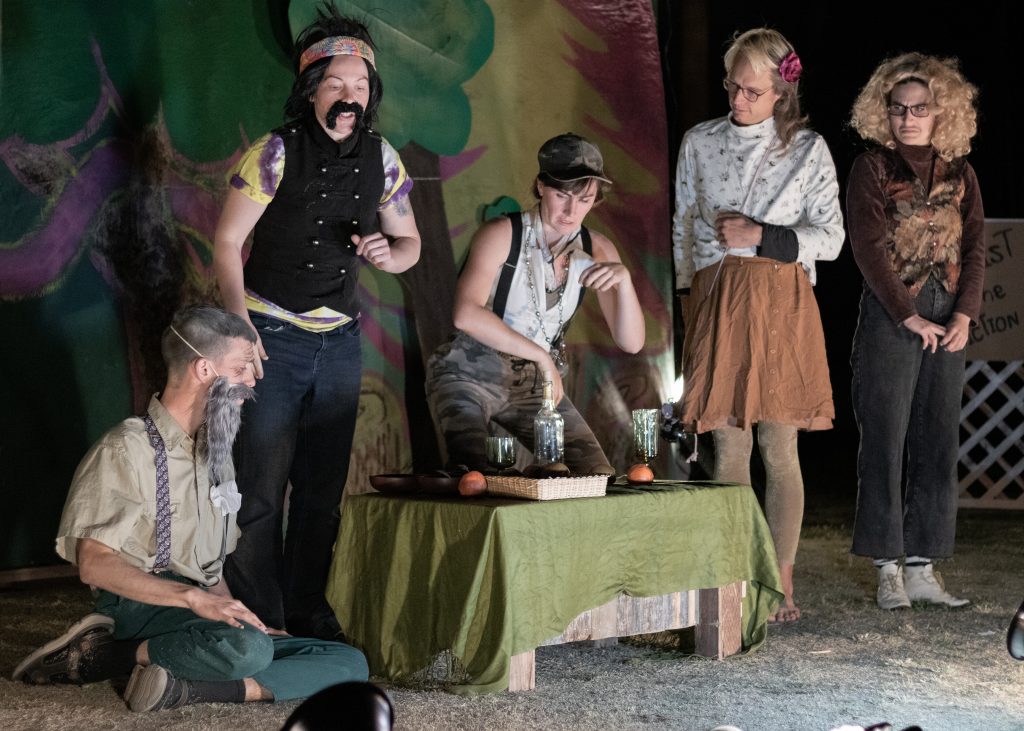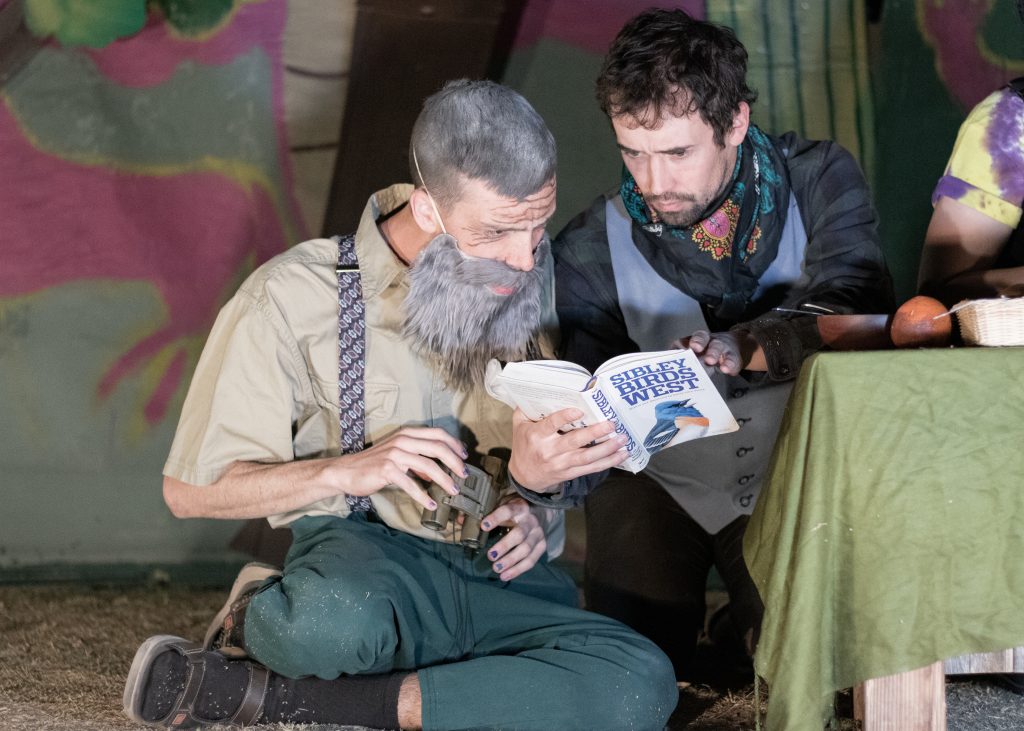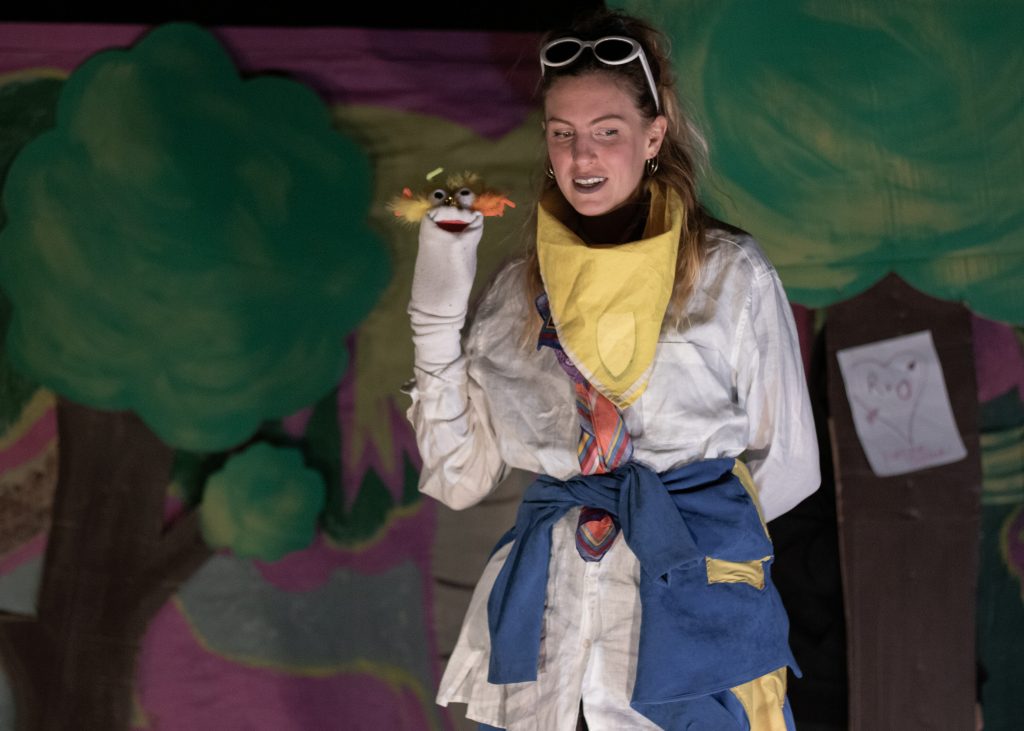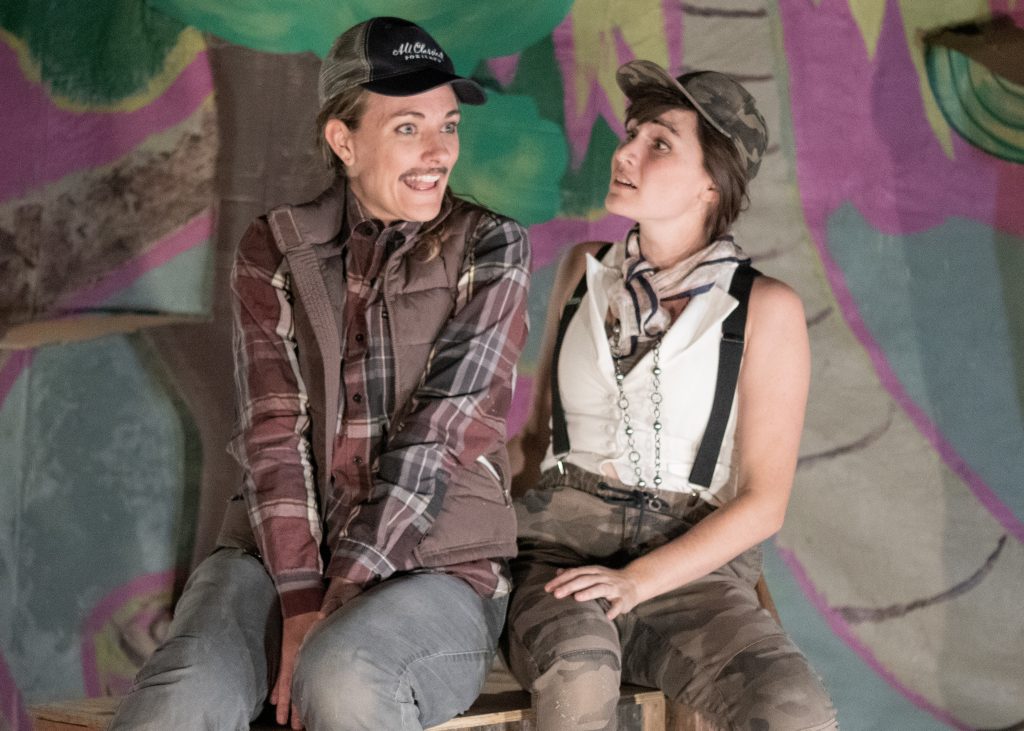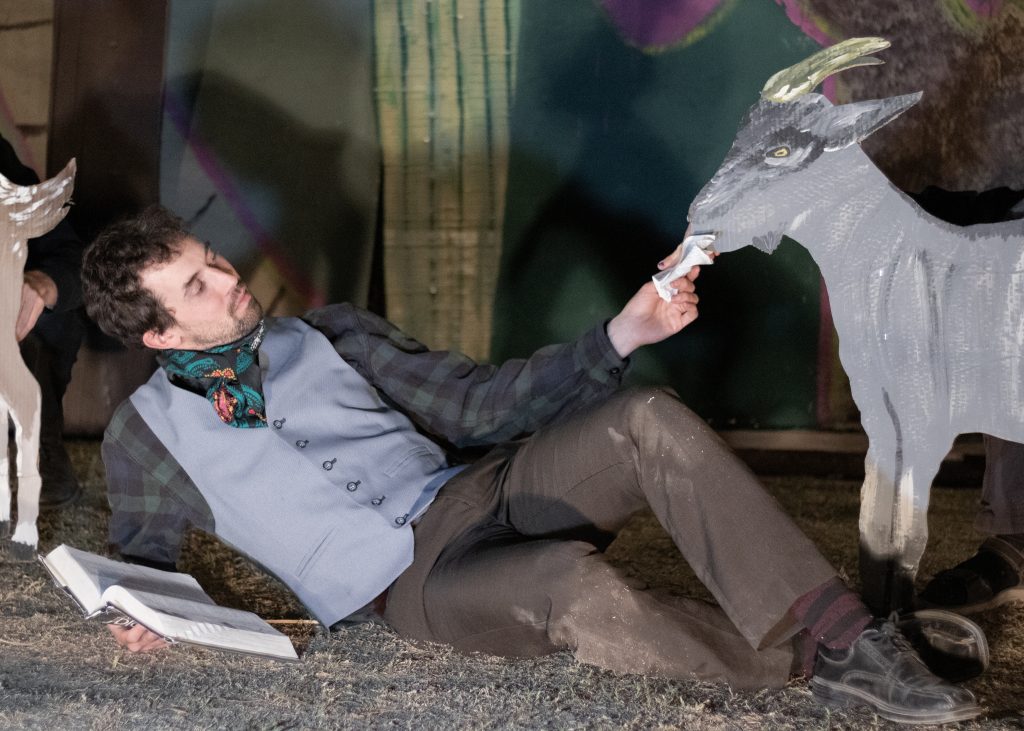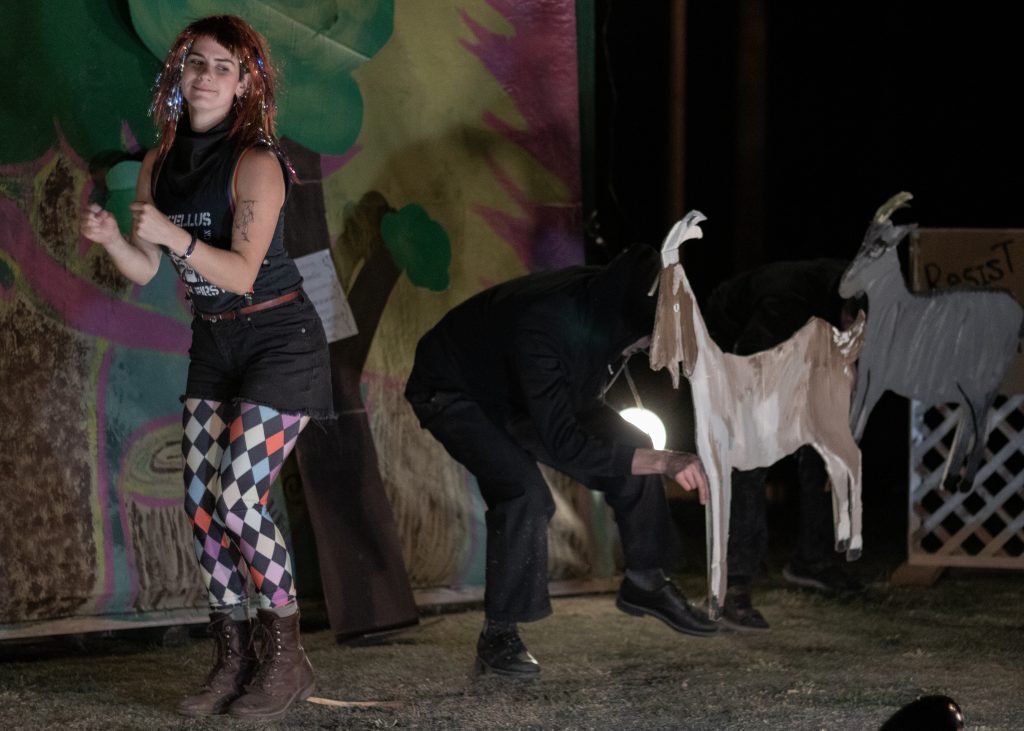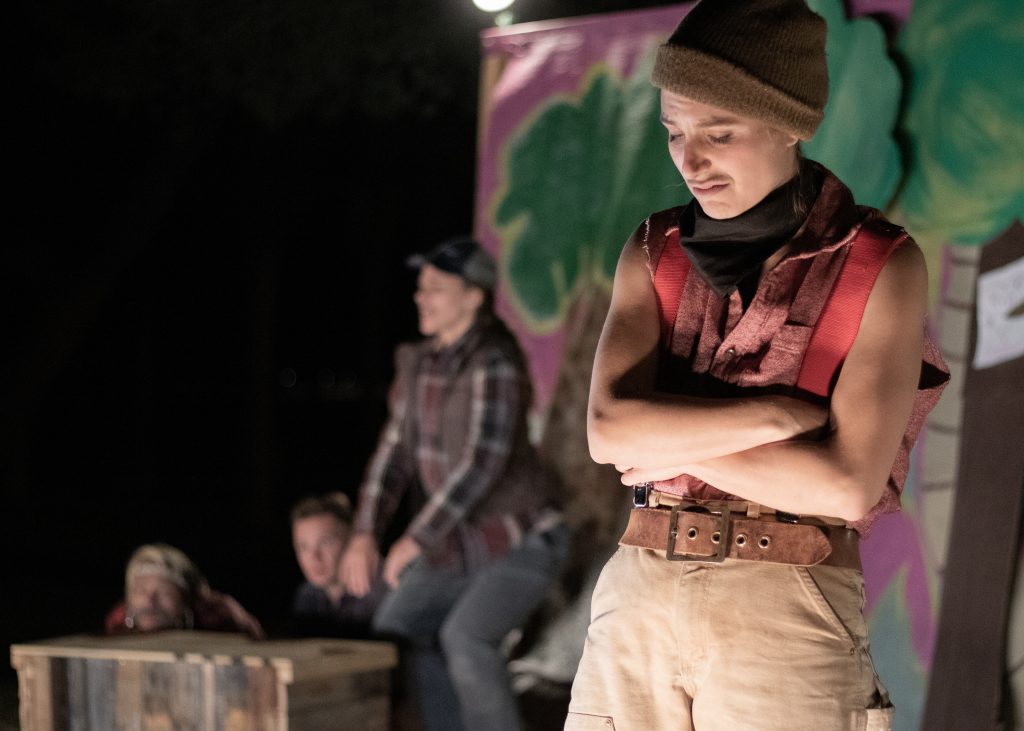Performed in Himmel Park (Tucson), Bisbee & Arivaca in April 2019
Welcome to the forest of Arden, located in a distant future where, after a lengthy bout of corporate feudalism, capitalism is being reborn. Deep in the woods, a crew of queer squatters live in an autonomous, collective community, where they herd goats, write zines, and build shacks. When Duke Senior, who rules over adjacent realms, is usurped by the especially evil Duke Frederick, the forest and its inhabitants come under threat: Frederick begins monetizing Arden by logging and selling off parcels of land to private owners. Unfortunately for him, Senior and other banished nobles find their way into the woods, where an elderly shepherd and a feisty young goatherd introduce the fancy folk to ideas that threaten to upend all of Frederick’s crooked plans.
Also, there’s romantic intrigue. Lots and lots of romantic intrigue.
ACT I
Orlando, a young nobleman, tells his older brother Oliver’s servant, Adam, that after his father died his brother refused to give him any support or education. A bit later, a wrestler, Charles, arrives to warn Oliver that Orlando plans to wrestle him tomorrow at the court of Duke Frederick, and that he must defend his honor but is worried about hurting Oliver’s brother, as he and Oliver are friends. Oliver trash talks Orlando and gives Charles permission to kill him, handing him a knife.

The next day, sweethearts Rosalind and Celia discuss the fact that Rosalind’s father, Duke Senior, has recently been banished by Celia’s father, Duke Frederick. Celia promises that when she receives her inheritance she will share it with Rosalind to make up for the unfairness of the situation. Soon, Touchstone, Frederick’s fool, and Le Beau, a courtier and wrestling promoter, arrive. Le Beau tells the duchesses that a wrestling competition is about to begin between Charles and Orlando. Rosalind tries to warn Orlando about his slim chances of success, but Orlando wrestles anyway and, improbably, beats Charles. Frederick is disappointed when he finds out Orlando is the son of one of his deceased enemies, Roland de Boys, but Rosalind is taken with the young nobleman and gives him a necklace. Le Beau warns Orlando to leave before Frederick lashes out against him, and says that he thinks the Duke will soon banish Rosalind, as well. This proves true–while Rosalind confesses their feelings for Orlando to Celia, Frederick barges in and kicks Rosalind out of the court, calling them a traitor. The girlfriends decide to travel to the forest of Arden together, where Rosalind’s father, the banished duke, lives. Rosalind decides to dress as a man and re-names themself Ganymede,[1] while Celia puts on peasant garb and takes the name Xena, Warrior Duchess.[2] Touchstone decides to join them on their adventure.
ACT II
Duke Senior holds court in Arden, waxing poetic about the freedoms of the forest.[3] But when he suggests hunting venison for supper[4] a group of his lords, The Amiens Family Band, mention that another member of his court, the melancholy and philosophical Jacques, was recently seen weeping over a slaughtered deer. The duke asks band to find Jacques, as he loves arguing with Jacques when he’s in “one of his fits.” Meanwhile, back at the court, Frederick realizes Celia is missing, and demands that Le Beau find Orlando, who he thinks is with his daughter and her sweetie (if Le Beau can’t find Orlando, Frederick asks that Le Beau bring him Oliver instead). Orlando isn’t in the forest, though–he’s returned home, where Adam warns him that Oliver is trying to kill him. Adam offers Orlando his life savings to sustain him, and the servant and Orlando leave for Arden together.

In the forest, Ganymede, Xena, and Touchstone meet a lovesick young shepherd, Silvius, and an old shepherd, Corin. The trio asks for help, but Corin says that he’s a hired hand, and his boss is selling off his land and flocks, leaving Corin and his family with nothing.[5] Ganymede and Xena say they will buy the land and raise Corin’s wages, a compromise that Corin agrees to, ultimately hoping to shift toward a more collective structure. Touchstone meets Audrey, a goat herder and ardent anarchist who promises to help him, while The Amiens Family Band finds Jacques, who begs the band to sing for him. The musicians light up the forest with their tunes.[6]
Orlando and Adam enter the forest. Orlando comes across Duke Senior, the band, and Jacques, and the duke invites him to a banquet. After Jacques’ gives a speech that you might just recognize from high school lit class (sort of!), the duke realizes that Orlando is the son of his friend Roland de Boys and doubles down on his warm welcome.
ACT III
Oliver is brought before Duke Frederick and claims he hasn’t seen his brother since the wrestling match and that, in fact, he hates Orlando. They make a plan to venture into Arden and kill the young exile, while Le Beau eavesdrops. Meanwhile, in Arden, Orlando tacks love poems he’s written for Rosalind onto trees. Ganymede, Xena, and Touchstone discover them and make fun of them until Xena admits she knows who wrote them. Ganymede begs her to tell them who and upon learning it was Orlando, becomes very excited. When Orlando crosses their path, Ganymede approaches him and Orlando admits he’s lovesick. Ganymede says they can cure Orlando by pretending to be Rosalind and acting out an imaginary courtship–which Ganymede promises won’t go well, and will sour Orlando toward Rosalind.
Touchstone and Audrey herd goats together. While Touchstone complains about the unmannered forest squatters, Audrey encourages the duke’s fool to think about things differently, explaining that she and her friends feel threatened by the banished nobility that has been moving into the forest and are determined to maintain it as an anti-authoritarian sanctuary.
Orlando stands Ganymede up, and Ganymede complains to Xena, who tries to convince them that Orlando doesn’t really care about them. Corin, Ganymede, and Xena then secretly see Silvius try to woo his crush, Phebe. When Ganymede tries to intervene on behalf of Silvius, Phebe falls for Ganymede instead, making things pretty awkward.
ACT IV
Orlando is late to a meeting with Ganymede, who says if Orlando is tardy again, Ganymede will stop hanging out with and helping him. Eventually, Ganymede forgives Orlando and they “pretend” to woo each other, even enlisting Xena as the “priest” who will “marry” them. After Orlando leaves to dine with Duke Senior–promising to be back in two hours–Xena criticizes Ganymede for stereotyping and deriding femmes in their conversation with Orlando. Ganymede responds by saying they’re head-over-heels in love with Orlando.
While Ganymede is waiting for Orlando to return, Silvius shows up to deliver a letter from Phebe. Silvius believes that the letter is in an angry tone but when Ganymede reads it, it is full of declarations of love. Ganymede declares that if Phebe loves them, she should speak to them about it directly. Adam enters and asks for directions to Ganymede’s cottage. Ganymede identifies themself, and Adam gives them a bloody handkerchief. He tells them that Xena came across Orlando with a snake around his neck. Xena scared the snake away, but then she noticed a lioness creeping out of the forest. Despite her jealousy about Ganymede and Orlando’s relationship, Xena fought the lion and saved Orlando’s life. At this point, Adam recounts coming across the pair and dragging Orlando into a cave to care for his wounds. Orlando asked that the bloody kerchief be sent to Ganymede. Xena runs in and Ganymede swoons into her arms.
ACT V
Touchstone and Audrey continue to romance each other, talking about the forest as a communal sanctuary. In another patch of Arden, Orlando tells Ganymede that he can’t continue pretending that Ganymede is Rosalind because it makes him too sad. Ganymede claims they know where Rosalind is, and will ensure that Orlando marries Rosalind the next day. Phebe and Silvius show up and the four of them talk of polyamory, crushes and wedding vows. Ganymede promises to marry Phebe the next day, but when they share that information–along with their plan to marry Orlando–with Xena, she seems dismayed.
Later, Xena admits to Ganymede–via emojis, of course!–that she’s been feeling ignored. Ganymede apologizes for getting caught up in their new romances and taking her for granted, then reaffirms their deep love for Celia. Ganymede confesses that they feel like both their new self and Rosalind, and Xena supports them in embracing a genderqueer identity. Xena declares that she will keep her forest name, as it better reflects the fierce af lady she has become in Arden. With only the trees as witnesses, the two lovers marry.
Finally, it’s queer poly wedding day! Rosalind, Silvius and Phebe join Orlando and Duke Senior in a clearing. Touchstone and Audrey also arrive to be married and consult with the duke, who declares he is done with lawmaking and wants to figure out how to take care of the forest collectively. The duke thinks he recognizes Ganymede as his daughter, and soon enough Ganymede reveals themself as being both Ganymede and Rosalind to Duke Senior and Orlando. Hymen, the ancient Greek god of love, deus ex machinas into the scene to marry the many lovers and all, for a moment, seems well … that is, until Le Beau shows up and warns the merry band that Duke Frederick is on his way to murder them and sell off their forest home. Luckily, the scrappy crew of queer squatters and ex-nobles are able to defeat Duke Frederick and his army. Ganymede/Rosalind bids the audience goodnight, reminding us all to “Love one, love many, dream, riot, and remember: though this be a work of fiction, its roots grow firmly in your world.[7] Enclosures can surround you at any time, and you too can tear them down. It’s as you like it.”
FOOTNOTES
[1] Ganymede is a gay hero in ancient Greek cosmology, and Shakespeare’s use of this reference suggests that he may have intentionally queered the play a bit. In “Crossdressing, the Theater, and Gender Struggle,” Jean E. Howard writes of Rosalind/Ganymede’s disguise: “When women took men’s clothes, they symbolically left their subordinate positions. They became masterless women, and this threatened overthrow of hierarchy was discursively read as the eruption of uncontrolled sexuality.”
[2] Shakespeare wrote As You Like It in the midst of the English enclosure riots, which were protests against the privatization of common land. An interesting and related fact about cross-dressing: Men resisting enclosure often disguised themselves as peasant women, both to obscure their identity and because women weren’t subject to the same laws around assembly that men were (although, in Caliban and the Witch, Silvia Federici notes that this law quickly changed, and women started to be arrested for rioting).
[3] In medieval and Renaissance-era European lore, the forest symbolized a place free from the trappings of civilization where the world could be “turned upside down” or, according to Richard Wilson in “‘Like the Old Robin Hood’: As You Like It and the Enclosure Riots”, was “symbolically outside capitalist order.” In this way, the forest had parallels with medieval carnivals, celebrations where hierarchies that governed society were temporarily reversed–fools were elected kings and church rituals were mocked and derided. While social roles aren’t fully switched in As You Like It–Senior is still a Duke, the squatters are still peasants–the forest functions as a carnivalesque setting because the normal rules that govern interactions between social classes have, for the most part, been set aside. Mikhail Bakhtin writes of the carnivalesque: “During time life the carnival is subject only to its laws, that is the laws of its own freedom.” Ultimately, he suggests, carnival existed as a valve to let off class frustrations and reify the existing social order. In Shakespeare’s version of the play, he follows this classic model of the carnivalesque, returning the world to the nobles in the end. In our version, we imagine a carnival that does not end, one where social roles are not so much reverse as dismantled and radically restructured. Participants in the enclosure riots of 16th and 17th century England also saw the potential of using the carnivalesque to make permanent change to the social order, sometimes even using festivals as an excuse to tear down enclosures.
[4] In the Middle Ages and Renaissance, all deer in English forests belonged to the king and the aristocracy, and hunting them was considered a felony. Duke Senior’s penchant for eating venison can be read as an act of resistance against Duke Frederick, or as an invocation of his aristocratic right.
[5] Here, Corin directly references the enclosures, and the transition from feudalism to capitalism. Enclosing included, according to Federici, “the abolition of the open field system, the fencing off of the commons, and the pulling down of the shacks of poor cottagers who had no land but could survive because they had access to customary rights,” as well as a transition from subsistence farming to wage labor. Proponents argued that enclosing would increase the food supply, but this extra food was sold at market and exported, rather than being made available to small farmers and cottagers. In fact, it actively damaged the food supply of villagers because they could no longer make decisions together about farming communal land or help each other out in collectively-held fields. While the commons were being enclosed in England, Spanish colonizers were “privatizing” (aka stealing) communally-held indigenous land in the so-called Americas and subjecting indigenous communities to forced labor. Federici connects the enclosures of the early modern era to contemporary World Bank policies, writing, “For workers the [European enclosures] inaugurated two centuries of starvation, in the same way as today, even in the most fertile areas of Africa, Asia, and Latin America, malnutrition is rampant due to the destruction of communal land-tenure and the ‘export or perish’ policy imposed by the World Bank’s structural adjustment programs.”
[6] According to Wilson, many of Amiens’ songs reference the political situations of the day and the mythology of Robin Hood and the Merry Men, a trope that was much invoked during the era of enclosure resistance.
[7] I want to end these footnotes by quoting adrienne maree brown, who writes so powerfully about imagination in her book Emergent Strategy: “Imagination has people thinking they can go from being poor to a millionaire as part of a shared American dream. Imagination turns Brown bombers into terrorists and white bombers into mentally ill victims. Imagination gives us borders, gives us superiority, gives us race as an indicator of capability. I often feel I am trapped inside someone else’s imagination, and I must engage my own imagination in order to break free. All of this imagining, in the poverty of our current system, is heightened because of scarcity economics. There isn’t enough, so we need to hoard, enclose, divide, fence up, and prioritize resources and people. We have to imagine beyond those fears. We have to ideate–imagine and conceive–together.”
